|
Translations
English translations by Paul Archer of poems by Kotaro Takamura, Federico Garcia Lorca, Miguel de Cervantes, Antonio Colinas, Conchi da Silva, Mario Bendedetti, León de Greiff, Eugenio Montale, Ingeborg Bachmann, Sabine Schiffner and Fyodor Tyutchev.
Kotaro Takamura
March 13, 1883 - April 2, 1956
Japanese poet and sculptor. The poems that form the Chieko Poems collection draw on the poet's own life experiences and, read as a sequence, tell the story of his relationship with Chieko through their courtship, marriage, her mental breakdown and death. They are an enduring testament to the power of love.
> Chieko Poems in English
To read more about the background to the poems, please go to:
> Kotaro Takamura and the Chieko Poems |
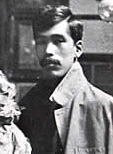 |
| |
|
Federico Garcia Lorca
June 5, 1898 - August 19, 1936
Spanish poet, dramatist and theatre director. His poetry is impassioned, elemental and often tortured by the vicissitudes of life and love.
> El Diván del Tamarit
Collection of 12 Gacelas and 9 Casidas.
> Sonnets of Dark Love
Collection of 11 sonnets.
Other poems:
Somnabulant Ballad
Crossroad
Tree, tree
Little Infinite Poem |
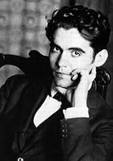 |
| |
|
Antonio Machado
July 26, 1875 - February 22, 1939
Born in Seville, he became a French teacher in Soria. His wife died after four years of marriage and this embued his early poetry with a sense of loss. In the lead up to the Civil War he was deeply concerned by his country's bestaucasinosonline.com/sa/ division into 'two Spains'. His cynical worldy-wise philosophy is captured in his Sayings and Songs (Proverbios y Cantares).
Sayings and Songs
Portrait
A Childhood Memory
To José María Palacio
From the ephemeral past
The crime was in Granada: to Federico Garcia Lorca |
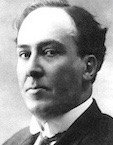 |
| |
|
Miguel de Cervantes
October 9, 1547 - April 23, 1616
Spanish novelist, poet and playwright. His most famous work, Don Quixote, is regarded as the first modern novel. Much of the plain-speaking and wit of the novel can also be found in his poems.
Sir Belianis of Greece to Don Quixote
At the Tomb of Philip II in Seville
On the Duke of Medina Entering Cadiz
War Calls Me
I Look for Life in Death
The Chains of Love
The Gypsies Dance
Castilian Redondilla
Ovillejos |
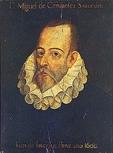 |
| |
|
Antonio Colinas
January 30, 1946 ~
Antonio Colinas was born in La Bañeza in the León region of Spain and is highly regarded as a poet and intellectual. His poetry explores and evaluates the human experience in its setting of the natural world in order to discover a transcendent reality. In 2016 he won the prestigious XXV Premio Reina Sofia de Poesia Iberoamericana.
A Tomb in Tarquinia
Translation of 'Sepulcro en Tarquinia'
Sepulcro en Tarquinia - introduction
An introduction to the poem with a glossary of names used in the poem.
Canto XXXV
The road blocked by the forest
The invisible labyrinth
Palace steps
Zamira loves wolves
The Home of Light
The Banks of the River Órbigo
Fantasy and Fugue in Santillana del Mar
Faith in Life
Giacomo Casanova accepts the post of librarian in Bohemia offered to him by the Count of Waldstein |
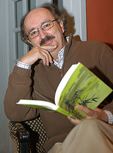 |
| |
|
Conchi da Silva
November 7, 1966 ~
Spanish poet from the region of Galicia. Her poems are daring and dangerous, examining the vicissitudes of life with an unflinching honesty and inner strength. Her collection of poems "Fisuras' (Fissures) was published in 2021 with a Portugeese translation.
The Goddess
You are simple and complex
My scaffolding
We calibrate works of art
Protect me
Out of the vine
To sleep on knives
Four corners to my bed
There are words
Being a poet |
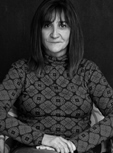 |
| |
|
Mario Benedetti
September 14, 1920 - 17 May 2009
Uruguayan poet who is hugely popular in Latin America but less well-known in the rest of the world. His deceptively simple style makes him accessible to all and his poems have much to say about life, love and the wider world.
I love you
Tactic and strategy
Vice versa
Armoured heart
Don't keep yourself safe
The perfect secretary
Little stones at my window
Resumé
Allende
The South Also Exists
What would happen...?
Mulatto
|
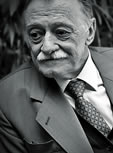 |
| |
|
León de Greiff
July 22, 1895 - July 11, 1976
Colombian poet. One of the founders of the modernismo movement in Colombia, León de Greiff's work is renowned for its innovative use of symbolic language and its aspiration towards the purity of music.
Cancion Nocturna
Cancionilla
This Rose Was A Witness
When love has fled, when love has gone |
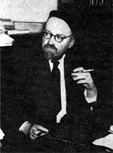 |
| |
|
Eugenio Montale
October 12, 1896 - September 12, 1981
Italian poet who won the 1975 Nobel Prize in Literature. He was influenced in particular by Dante and T.S.Eliot. He uses the concept of the 'objective correlative' when relating nature to human thoughts and feelings. His poems often deal with his tortured relationship with women that, like Dante's Beatrice, become muses and mediatrix.
Fire and darkness
The lemons
The eel
The storm
Don't ask us for the word
To rest at noon
You reach happiness
Towards Finistère
About a letter that wasn't written
I've often come up against the bad part of living |
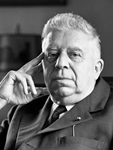 |
| |
|
Rainer Maria Rilke
December 4, 1875 - December 29, 1926
Born in Prague, Rilke is regarded by many as the greatest lyric poet in the German language. Influenced by Rodin from his time in Paris, his lyric poetry is evocative and metaphysical, but grounded in close observation of the poem's subject and setting.
The Panther
The Gazelle
Black Cat
The Steps of the Orangerie
Spanish Dancer
Piano Practice
Before summer rain
Autumn Day
Do you still remember the shooting stars
The Apple Orchard
The Spanish trilogy |
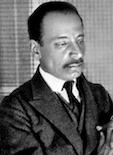 |
| |
|
Ingeborg Bachmann
June 25, 1926 - October 17, 1973
Austrian poet who was part of the Gruppe 47 whose members also included Paul Celan, Heinrich Böll and Günter Grass. She spent much of her later life in Italy before her untimely death. The annual Ingeborg Bachmann Prize, one of the most prestigious prizes in German literature, is named after her.
Every Day
Deferred time
In your eyes there are windows
The land of fog
A Version of Loss
Advertising
To the Sun
Departure
The ports were open
After this Flood |
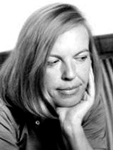 |
| |
|
Sabine Schiffner
1965 ~
Contemporary German poet and novelist. Schiffner was born in Bremen and has since lived in Cologne and Mallorca. Her collection of poems entitled Dschinn was published by S. Fischer in 2007 followed by Fremd gedanken published by Voss Hollemann in 2013.
orange marmalade
mosquitoes
wanderlust
you bright autumn
yellowhammers
the song of the bad shepherd on mallorca
melaten
what you say
klajumi
from the depths
breezy days
howling
hibiscus
winds
cryology (the study of snow)
your house on the hill
with such joy
the village at night
dragonfly wind |
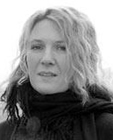 |
| |
|
Fyodor Tyutchev
December 5, 1803 - July 27, 1873
Russian poet. Although his poems were scarcely published in his lifetime, he is now one of the most memorised and quoted of writers from the Romantic period of Russian literature.
After the Feast
Dull Flame of Desire
|
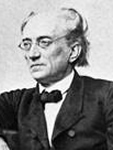 |
| |
|
Felice Romani
January 31, 1788 - January 28, 1865
Italian poet and librettist who wrote 90 librettos for Donizetti, Bellini, Rossini and other composers. Translated here (with an introduction) is the libretto for Chiara e Serafina, an opera set on Mallorca composed by Donizetti.
Chiara e Serafina |
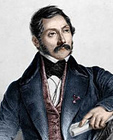 |
| |
|
| |
|
Early music lyrics
From the 15th to the early 17th century.
Translations of Italian, French and Spanish song lyrics from the Medieval, Renaissance and Baroque periods.
Translations of early music texts |
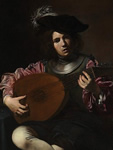 |
|

